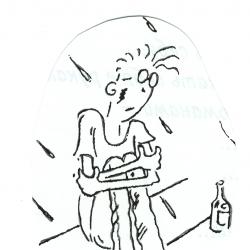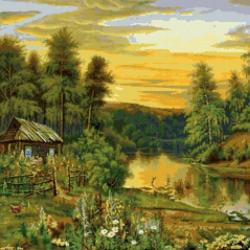Texts in German for reading and translation. material on the German language on the topic. Some examples of a more complex self-narration in German Short stories in German for beginners
What could be more interesting and entertaining on a cold winter evening than reading a book? When it's cold outside, but the house is warm and cozy. Only books written by authors from other countries in the original language. Among German authors there are many well-known and popular in Russia, translated not only into Russian, but also into many others. Reading has many advantages for each person, including the expansion of vocabulary, the development of visual memory and literacy, and the emergence of an intuitive understanding of the rules.
For Russian speakers, there are 3 main options for books in German:
- Original, unaltered texts;
- Adapted works;
- Books adapted "according to Frank".
The first and last options are only suitable for a high level of knowledge of the German language, when the vocabulary is at a level above the average. Only then will reading books bring joy, and not make you spend a lot of time translating the text. For beginners, you need to choose simpler literature so that there are few words used, and the meaning is clear without translation. You can take children's books with simple familiar stories, some of them do not even need to be translated - their meaning is clear and known from childhood.
German. Levels of knowledge - A, B, C
When learning German, people move from level to level, expanding their vocabulary, gaining knowledge of grammar and practicing to form sentences from words. First comes the study of the alphabet, then the simplest words are added: nouns and verbs used daily. Then prepositions and other parts of speech are added. Simple dialogues gradually develop, pronunciation is developed. Total language proficiency levels 3:
To move to a new level, you need regular classes, an integrated approach to learning and a variety of exercises to reinforce interest:
- Methodical books with tasks, rules and exercises are the basis for the entire learning process. Without a theoretical justification, you can learn a language by being born into a German family or living in Germany.
- Additional literature: books, magazines, thematic sites and communities;
- Music in German allows you to combine business with pleasure - to enjoy the melody and practice pronunciation;
- Films and videos with and without subtitles teach German speech sound, sentence structure and conversational features of the language;
- Studying the history of Germany and its traditions, bringing them into your life, will introduce you to the country from the inside, will allow you to better understand the peculiarities of the mentality;
- Communication with other students, teachers, friends in German, search for native speakers on forums and social networks.
At the initial stages, exercises, a personal dictionary and feedback from the teacher are enough, later you need to connect other types of classes to your liking.
How to determine your level of language proficiency?
If you studied German at school or institute, attended courses or studied it on your own, then the basic level should be a priori. To find out or test your knowledge, you can take online or offline testing, and the situation will be clear based on its results.
Another option is to take a book or material designed for an intermediate level of language knowledge - B1-B2 and try to do tasks without preparation and read the texts.
If the task turned out to be too simple, and the dictionary was needed only a couple of times, then repeat the procedure with texts of complexity A.
The reverse situation is the level B exercises are too difficult, then we go one step lower and try to understand the meaning of the light adapted text.

The third option is the most difficult. You need to take the level of knowledge for "nothing" and start from the basics, that is, from the first lessons. Something has been forgotten over the years without training, something has changed in the education system. If some knowledge remains, then at first you will simply do all the exercises, and you will smoothly reach the desired level.
The ideal version of the book would be a text that is understandable when reading, where unfamiliar words can be guessed from the context or a dictionary will be consulted a couple of times per page. Then the vocabulary grows, and there is no tension in mastering the language.
Books for level A1
Few people at the A1 level will be puzzled by reading literature, then they would master the entire volume of exercises and learn how to pronounce sounds and words correctly. More than 2-3 pages is difficult to master, you often have to look in the dictionary. Therefore, you can take children's picture books, short stories, special texts in German.
- Thomas Silvin and his series of short stories, they can be read at the very beginning of the training: "Anna, Berlin", "Claudia, Mallorca", "Eva, Wien", "Franz, München".
- Mary Shelley and the famous saga about the crazy professor "Frankenstein", adapted for the initial level of knowledge.
- Theo Scherling / Elke Burger and several stories by the author: "Der Filmstar", "Eine Liebesgeschicht", "Der 80. Geburtstag", "Die Neue".
- Writer Roland Dittrich with his famous works: "Die Skorpion Frau", "Ein Schuss ins Leere", "Kaltes Blut", "Leise kommt der Tod".
As soon as your vocabulary expands so much that the presented works seem simple, feel free to move on to the next step.
Second stage - A2
Level A2 is already characterized by some understanding of the structure and construction of sentences, initial knowledge of grammar and word formation. Here in the vocabulary there are already up to 600 words, if necessary, you can maintain a dialogue, ask for directions and tell something to the interlocutor. These include books:
.jpg)
There are already relatively more stories at this level than at A1, anyone can choose according to their liking and mood. On average, 5-15 pages are enough for comfortable reading, more is already more difficult to master. If these books seem easy to you, move on to the next step.
Literature for level B1
With a vocabulary of 1000-2500 words, you can already start more complex works, try to read short stories and poems in the original, without adaptation. And complex classic B2 novels can be selected from the following list:

Most students stay at this level of learning because knowledge is enough to communicate and have fun.
What to read with level B2?
With a fluency of more than two thousand words, you can choose almost any work, except for scientific literature and technical documentation. These can be adapted texts, works of famous writers, written in German or other languages and translated after. You can slowly add books from the methodology of Ilya Frank.
Leonhard Thoma and his works "Der Ruf der Tagesfische und andere Geschichten" and "Die Blaumacherin".

Achim Seiffarth Der Sandmann. Connect magazines, newspapers and articles on websites on the Internet. This approach expands not only vocabulary, but also horizons.

Books for advanced level C1-C2
Oddly enough, but a quarter of native Germans do not have a vocabulary of more than 3000-4000 words, they are helped by familiarity with the language from birth. But in the future, such people read little, work hard and develop little, so not even every German can read books of an advanced level.

Here, not only fiction is used, but also all kinds of scientific treatises, articles, technical and other studies, legal acts and specialized texts. If you work in German, then as speech and vocabulary develop, specific concepts also accumulate.
Noteworthy books in German
The Great Gatsby by the equally great Francis Scott Fitzgerald.

The list can be long, the entire classical library of all countries of the world has been translated into German too, high-level translators worked on each book, often together with the author.
Method of Ilya Frank
Speaking about learning a language by reading books, one cannot fail to mention the adaptation method from Ilya Frank. The texts remain unchanged, they are supplemented by translation after each paragraph, or inside it, explanations, additions. Books thus become more understandable to readers, a dictionary is not required, which greatly speeds up the reading process.

There is also a minus - most often books were taken into work that were difficult for the initial and intermediate level of knowledge of German. It will be possible to read “according to Frank” with B2, or even with C1, before it will be very difficult to understand the text, remember a bunch of new words and master a long work. And if you combine reading books with listening to audio recordings, you can also improve your pronunciation.
As an afterword
It is impossible to exaggerate the importance of books in our life, they give us any type of knowledge, incomparable pleasure in the process of reading and fantasizing, the opportunity to know another life, a different point of view, a different cultural and temporal era. The book pleases and amuses, can sadden and upset, clarify difficult moments and show the depth of our ignorance.

Books in German provide an opportunity not only to immerse yourself in another world and learn something new, but also to help yourself with learning a foreign language. With the proper level of preparation, you can feel the thoughts and feelings of the author, the inner lyrics and soul of the work.
Reading books in any language is a great pastime that promotes spiritual and cultural development.
Es war einmal eine alte Geiß, die hatte sieben junge Geißlein. Sie hatte sie so lieb, wie eben eine Mutter ihre Kinder liebhat. Eines Tages wollte sie in den Waldgehen und Futter holen. Da rief sie alle sieben herbei und sprach: “Liebe Kinder, ich muß hinaus in den Wald. Seid inzwischen brav, sperrt die Türe gut zu und nehmt euch in acht vor dem Wolf! Wenn er hereinkommt, frißt er euch mit Haut und Haaren. Der Bösewicht verstellt sich oft, aber an seiner rauhen Stimme und an seinen schwarzen Füßen werdet ihr ihn gleich erkennen.”
Es war einmal ein Mann, der hatte einen Esel, welcher schon lange Jahre unverdrossen die Säcke in die Mühle getragen hatte. Nun aber gingen die Kräfte des Esels zu Ende, so daß er zur Arbeit nicht mehr taugte. Da dachte der Herr daran, ihn wegzugehen. Aber der Esel merkte, daß sein Herr etwas Böses im Sinn hatte, lief fort und machte sich auf den Wegnach Bremen. Dort, so meinte er, könnte er ja Stadtmusikant werden.
Zur Winterszeit, als einmal ein tiefer Schnee lag, mußte ein armer Junge hinausgehen und Holz auf einem Schlitten holen. Wie er es nun zusammengesucht und aufgeladen hatte, wollte er, weil er so erfroren war, noch nicht nach Haus gehen, sondern erst Feuer anmachen und sich ein bißchen wärmen. Da scharrte er den Schnee weg, und wie er so den Erdboden aufräumte, fand er einen kleinen goldenen Schlüssel.
In den alten Zeiten, wo das Wünschen noch geholfen hat, lebte ein König, dessen Töchter waren alle schön; aber die jüngste war so schön, daß die Sonne selber, die doch so vieles gesehen hat, sich verwunderte, sooft sie ihr ins Gesicht schien. Nahe bei dem Schlosse des Königs lag ein großer dunkler Wald, und in dem Walde unter einer alten Linde war ein Brunnen; wenn nun der Tag recht heiß war, so ging das Königskind hinaus in den Wald und setzte sich an den Rand des kühlen Brunnens - und wenn sie Langeweile hatte, so nahm sie eine goldene Kugel, warf sie in die Höhe und fing sie wieder; und das war ihr liebstes Spielwerk.
Hilfe suchend kam einmal eine Frau zu einer alten Hexe und fragte sie, ob sie ihr nicht ein kleines Mädchen verschaffen könnte.
"O ja, das soll nicht schwer halten!" sagte die Hexe. „Da hast du ein Gerstenkorn; das ist nicht etwa von der Art, wie es auf einem Bauernfelde wächst, oder womit die Hühner gefüttert werden. Lege es in einen Blumentopf, dann wirst du etwas zu sehen bekommen!”
"Besten Dank!" in der Knospe waren.
Ein afrikanisches Alpenland, überreich an Schönheiten und Wundern der Natur, bewohnt von einem begabten Volke, das gleich uns zum kaukasischen Stamme gehört und mit den Negern nichts zu schaffen hat, eine an fesselnden Abenteuern reiche Folge von Reisench in der Fugland, endzliich dieses England gegen den eisernen, blutigen Theodor, der mächtig über Abessinien geherrscht, wie noch kein dunkelfarbiger König vor ihm – das ist es, was wir in diesem Bande des „Buches der Reisen und Entdeckungen“ den Lesern vorführen wollen.
O schöner, goldner Nachmittag,
Wo Flut und Himmel lacht!
Von schwacher Kindeshand bewegt,
Die Ruder plätschern sacht
Das Steuer halt ein Kindesarm
Undlenket unsre Fahrt.
So fuhren wir gemachlich hin
Auf träumerischen Wellen -
Doch ah! die drei vereinten sich,
Den müden Freund zu quälen -
Sie trieben ihn, sie drängten ihn,
Ein Mährchen zu erzählen.
Die erste gab "s Commandowort;
O schnell, o fange an!
Die Zigeuner sind aus vielen Schilderungen bekannt. Über ihr Leben, ihre Sitten und Gebräuche wurde schon viel geschrieben, Wahres und Unwahres, oft geradezu Haarsträubendes. Merkwürdigerweise, so reich die Literatur über die Zigeuner ist, behandelt diese doch zumeist nur die Ausländer, hauptsächlich die ungarischen und österreichischen Zigeuner. Dagegen ist die Kenntnis über die deutschen Zigeuner noch sehr gering. Dem Forscher steht daher hier noch ein großes Feld der Betätigung offen.
Deutsches Leben der Gegenwart - dem feindlichen Blick, der nur seine Oberfläche streift, möchte scheinen, daß die Gegenwart wenig vom deutschen Leben, mehr vom deutschen Sterben zu melden hätte. Aber der nachdenkliche Betrachter weiß, daß die größten geistigen Epochen Deutschlands über seinen politischen Niederlagen wuchsen, daß gerade die Zeiten nach dem Dreißigjährigen Krieg, nach dem Zusammenbruch von Jena zu den schöpferischen des deutschen Lebens gehö. Und so wird seinem geschärften Auge nicht entgehen, wie auch heute hinter der zerstörten und zersetzten deutschen Außenwelt seelische und geistige Kräfte keimen - in heiligem Trotz dem Elend und Leid der Gegenwart entkeiverheimen - die einelands Verjüngung und Vertiefung, eine Ertiefung
In Deutschland in einem wilden Wald, zwischen Gelnhausen und Hanau, lebte ein ehrenfester bejahrter Mann, und der hieß Gockel. Gockel hatte ein Weib, und das hieß Hinkel. Gockel und Hinkel hatten ein Töchterchen, und das hieß Gackeleia. Ihre Wohnung war in einem wüsten Schloß, woran nichts auszusetzen war, denn es war nichts darin, aber viel einzusetzen, nämlich Thür und Thor und Fenster. Mit frischer Luft und Sonnenschein und allerlei Wetter war es wohl ausgerüstet, denn das Dach war eingestürzt und die Treppen und Decken und Böden waren nachgefolgt. Gras und Kraut und Busch und Baum wuchsen aus allen Winkeln, und Vögel, vom Zaunkönig bis zum Storch, nisteten in dem wüsten Haus. Es versuchten zwar einigemal auch Geier, Habichte, Weihen, Falken, Eulen, Raben und solche verdächtige Vögel sich da anzusiedeln, aber Gockel schlug es ihnen rund ab, wenn sie ihm gleich allerlei Braten und Fische als Miethe bezahlen wollten.
In weiter Kammer schlief ich und die Brüder
Auf stillen Betten, die der Traum umspielet;
Der Amme Lied ertönte still, und nieder
Die Winternacht mit kalten Sternen zielet.
Gesegnet seid, ihr ernsten nächt "gen Scheine,
Die ihr mir in die junge Seele fielet!
Ich fühlte ruhig mich, in Frieden klar und reine;
Der Brüder Herzen hört ich um mich schlagen,
Ergötzt war meine Brust, ich wacht alleine,
Hört sie im Traum die kindschen Wünsche klagen.
What to read in German? Adaptive literature is often not interesting to read, and well-known German novels are often too voluminous and complex. So what is suitable for those who have never read or want something simple and interesting? Here is a selection of literary resources for reading in German.
short stories
Kurzgeschichten is a universal reading variant in German. Such stories will be useful both for those who have never read German literature in the original, and for experienced book lovers who like to “eat” a story in one day. There are many German writers who write exclusively in this genre.
Wolgang Borchert
One of the most famous writers of short stories, Wolfgang Borchert, is a post-war writer. Although his stories are short, at the same time they can create such a voluminous picture in your head that after reading you can walk for days and think, “What happened next?” Borchert's stories are written in short sentences and in simple language, so for beginners in literary reading - just right.
11 stories by Borchert can be found.
Heinrich Boll
Another famous post-war writer, Nobel Prize winner. It is believed that the topics that he touches on in his stories still have not lost their relevance. Writer Tanja Dukers said: "Man müsste sogar sagen: Bölls Themen sind auf unheimliche Weise zu uns zurückgekehrt."("More than that: Böll's Themes have terribly returned to us").
Francois Loeb
Swiss politician and writer (still living, by the way) who has a great website with lots of short stories and even voice acting. The stories can be downloaded. The only negative is that Loeb writes like a stream of thought, so often the story is not divided into paragraphs, which can make reading difficult. But since his creations do not exceed two pages, one can, in principle, put up with the absence of paragraphs. In any case, it's worth taking a look.
You can read his stories.
Miscellaneous
This portal is completely dedicated to modern short stories and novels. Each work has a description and the number of words in the text. The stories are divided into topics, so you can quickly pick up reading matter to your taste.
There is also such an interesting portal - https://www.kurzgeschichten-stories.de. Here you can also read a lot of short things.
And a million more stories in different directions, including those on holiday themes (Christmas, Easter, etc.)
And finally, a few well-known short stories by different writers from the “classic of the genre” series:
- Gunter Grass: Im Tunnel
- Ilse Aichinger: Das Fenster-Theater
- Peter Bichsel: San Salvador
- Rainer Brambach: Kansterle
- Gunter Grass: Die Linkshander
- Marie Luise Kaschnitz: Eisbären
- Günter Kunert: Lieferung frei Haus
- Kurt Kusenberg: Herr G. steigt aus
- Siegfried Lenz: Der grosse Wildenberg
- Christoph Meckel: Die Vampire
- Christa Reinig: Skorpion
- Wolfdietrich Schnurre: Auf der Flucht
- Gunter Seuren: Das Experiment
- Oliver Storz: Lokaltermin
- Martin Walser: Die Klagen über meine Methoden häufen sich
- Georg Britting: Brudermord im Altwasser
Texts with exercises
On this portal you can find very short texts, but with exercises. These are not literary, but rather journalistic texts and sometimes poetry. Most texts are suitable for level A2. You can read about German cities, holidays, writers and everyday topics.
Texts with exercises can be downloaded from the Derdiedaf portal. Genre journalistic, language level A2-B2. A small selection from this portal.
Tell me about yourself in German given with the translation. Text will help students compose your own biography in German. The text can also be adapted for schoolchildren.
1. Ich heiße Iwanowa Julia Wladimirowna. (My name is Yulia Vladimirovna Ivanova)
2. Mein Lebenslauf ist ziemlich kurz. (My biography is quite short)
3. Ich bin am 10. November 1985 in Neue Nekous geboren. (I was born on November 10, 1985 in Yaroslavl)
4. Hier lebe ich bis heute. (This is where I still live)
5. Ich bin Russin. (I'm Russian).
6. Mit sieben Jahren kam ich zur Schule. (This is the age I went to school)
7. Seit 1992 besuchte ich die Mittelschule in Nekous. (Since 1992, I have attended Necouse High School)
8. Hierlernte ich viele Fächer: Literatur, Russisch, Deutsch und so weiter. (Here I studied many subjects: Literature, Russian language, German language and so on)
9. Meine Lieblingsfächer sind Biologie und Chemie. (My favorite subjects are biology and chemistry)
10. Im Jahre 2001 habe ich die Mittelschule been det. (I graduated from high school in 2001)
11. Später bin ich nach Rybinsk gefahren. (Later I moved to Rybinsk)
12. Dort habe ich Medizin erfolgreich im College studiert. (There I successfully studied medicine in college)
13. Nach dem College habe ich 3 Jahre in Sanatorium gearbeitet. (After college, I worked in a sanatorium for 3 years)
14. Jetzt arbeite ich als Krankenschwester in Nekous. (Now I'm working at the Necouse as a nurse)
15. Meine Arbeit ist sehr interessant. (My work is very interesting)
16. Gleichzeitig studiere ich Management in …. . (At the same time, I study management at …)
17. Ich bin unverheiratet. (I'm single)
18. Meine Familie besteht aus fünf (5) Personen: meine Mutter, mein Vater, mein Bruder, meine Schwester und ich. (My last name consists of 5 people: my mother, my father, my brother, my sister and me)
19. Ich finde meine Familie sehr glücklich. (I consider my family happy)
20. Ich bin 24 (vierundzwanzig) Jahre alt. (I am 24 years old)
21. Meine Hobbys sind: Bücher, Musik und Computer. (My hobbies are books, music and computer)
Did you like it? Click the button:
In one of our past articles, we already told you where to find . You can start reading them already from levels A1-A2.
At a certain level of language learning (usually occurs at about B2 level), there is a need to read original literature. After all, there is already enough, the main ones have been learned, and reading the adapted texts is already rather boring ...
Our correspondent Mila Yakovenko has collected five German authors whose works are worth reading:
1. Otfried Preusler "The Little Witch"
/ Otfried Preußler "Die kleine Hexe" /This book can be read by both adults and children from level B1. The book tells about the adventures of a kind little witch, the German language is not difficult here, but there will be interesting phrases and new words. Based on this book cartoon both in German and Russian.
2. Bernhard Schlink "The Reader"
/ Bernhard Schlink "Der Vorleser" /Perhaps my favorite novel in German and, in my humble opinion, a must-read for anyone who has started reading German authors. The language of the story is not complicated, the storyline is exciting. If, nevertheless, reading initially seems difficult to you, you can read the book in Russian, and then re-read it in the original language. Based on this book, director Stephen Daldry made a film of the same name, where Kate Winslet played the main role. In general, start reading, you will not regret it.
3. Novels by Erich Maria Remarque
/ Erich Maria Remarque /"Three Comrades", "A Night in Lisbon", "Life on Loan", "Arc de Triomphe" - most of us have read books by this author in Russian, so you can safely choose a novel that you have already read in your native language. Remarque's German language is "live", not difficult to understand. Most of E.M. Remarque filmed.
4. Jojo Moyes "After You"
/ Jojo Moyes "Ein ganz neues Leben" /5. Elias Canetti “Saved language. The story of one youth "
/ Elias Canetti "Die gerettete Zunge: Geschichte einer Jugend" /A biographical novel written by a Nobel laureate in literature and tells about the author's difficulties, including learning the German language. The German language of E. Canetti is not simple, concise and consistent; I recommend reading with a level not lower than B2-C1.
Which books in German do you like the most?







